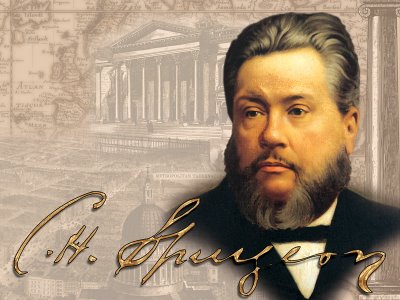
Today marks the 114 anniversary of the Home-Going of Charles Spurgeon. The following excerpts come from W.Y. Fullerton's biography of Spurgeon in the chapter entitled: The Triumphant End.
"IN THE LAST HOUR of the last day of January, 1892, the spirit of Spurgeon sped home from his loved Mentone. After forty years of unexampled ministry, he entered into rest. Two or three days before the end he said to his secretary, "My work is done," and after that he had nothing to do but to wait the summons. There were no raptures, no heroics, nor were there any fears or hesitations. Shortly after ten o'clock Joseph Harrald was sure he saw a company of angels hovering over the Berceau; at five minutes past eleven only the body was justify on the bed; before twelve Mrs. Spurgeon led the little group in praise and prayer. It was so quiet, yet it was so triumphant. All the bugles were blown as he departed, and the trumpeters sounded for him on the other side. It was a right enough instinct which made the mourners choose as his text, "I have fought a good fight; I have finished my course; I have kept the faith." When it was quoted at the funeral people asked when he said it. He never said it, he did it all the time.
Like John Calvin, Jonathan Edwards, Jeremy Taylor, George Whitefield and William Tyndale, Spurgeon was fifty-seven when he died, but he was not young, for he began early and he had laboured long, and departed full of days and of grace."
"Many years ago, in one of his sermons, published at the time, he attempted to picture the scene at his own funeral, and expressed his own desire concerning it.
"In a little while," he said, "there will be a concourse of persons in the streets. Methinks I hear some one inquiring—
"'What are all these people waiting for?'
"'Do you not know? He is to be buried today.'
"'And who is that?'
"'It is Spurgeon.'
"'What! the man that preached at the Tabernacle?'
"'Yes; he is to be buried today.'
"That will happen very soon. And when you see my coffin carried to the silent grave, I should like every one of you, whether converted or not, to be constrained to say, 'He did earnestly urge us, in plain and simple language, not to put off the consideration of eternal things; he did entreat us to look to Christ. Now he is gone, our blood is not at his door if we perish.'"
Far more abundantly than he dared to hope have his wishes been fulfilled, and only in the day when all things shall be revealed, shall it be known how many have been turned to the Lord by the death of the man who was so greatly honored to lead people to the feet of Jesus during his life."
In John Ploughman's Talk there is a sentence which runs,
Let the wind blow fresh and free over my grave, and if there must be a line about me, let it be—
Here lies the body of
JOHN PLOUGHMAN,
waiting for the appearing of his
Lord and Saviour
Jesus Christ.2
A few days before the end, at Mentone, he said, "Remember—a plain slab, with C. H. S. upon it: nothing more." But love denied the last request; and reverence substituted the name "Charles Haddon Spurgeon" for that of John Ploughman. Then on one side of the tomb is the verse of the hymn he was accustomed to write in albums, and the verse that follows it.
E'er since by faith I saw the stream
Thy flowing wounds supply,
Redeeming love has been my theme,
And shall be till I die.
No comments:
Post a Comment